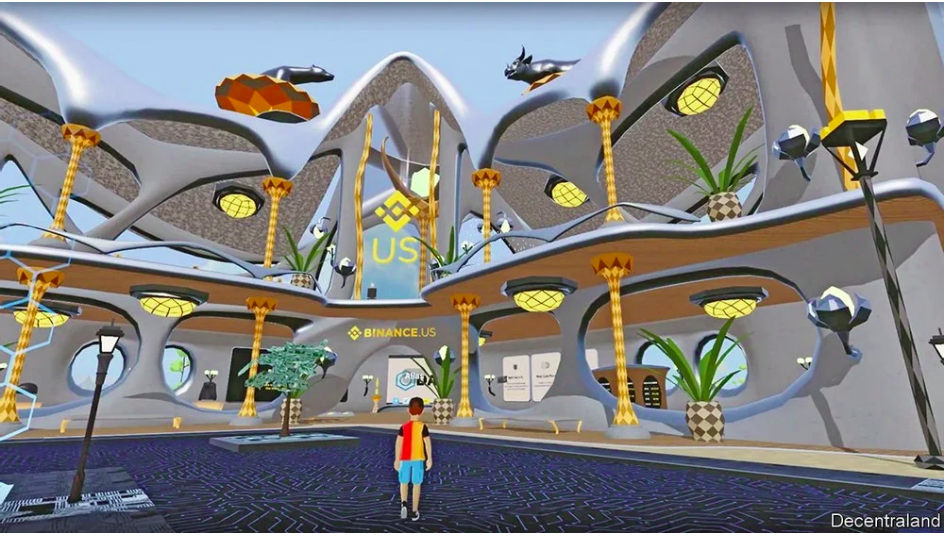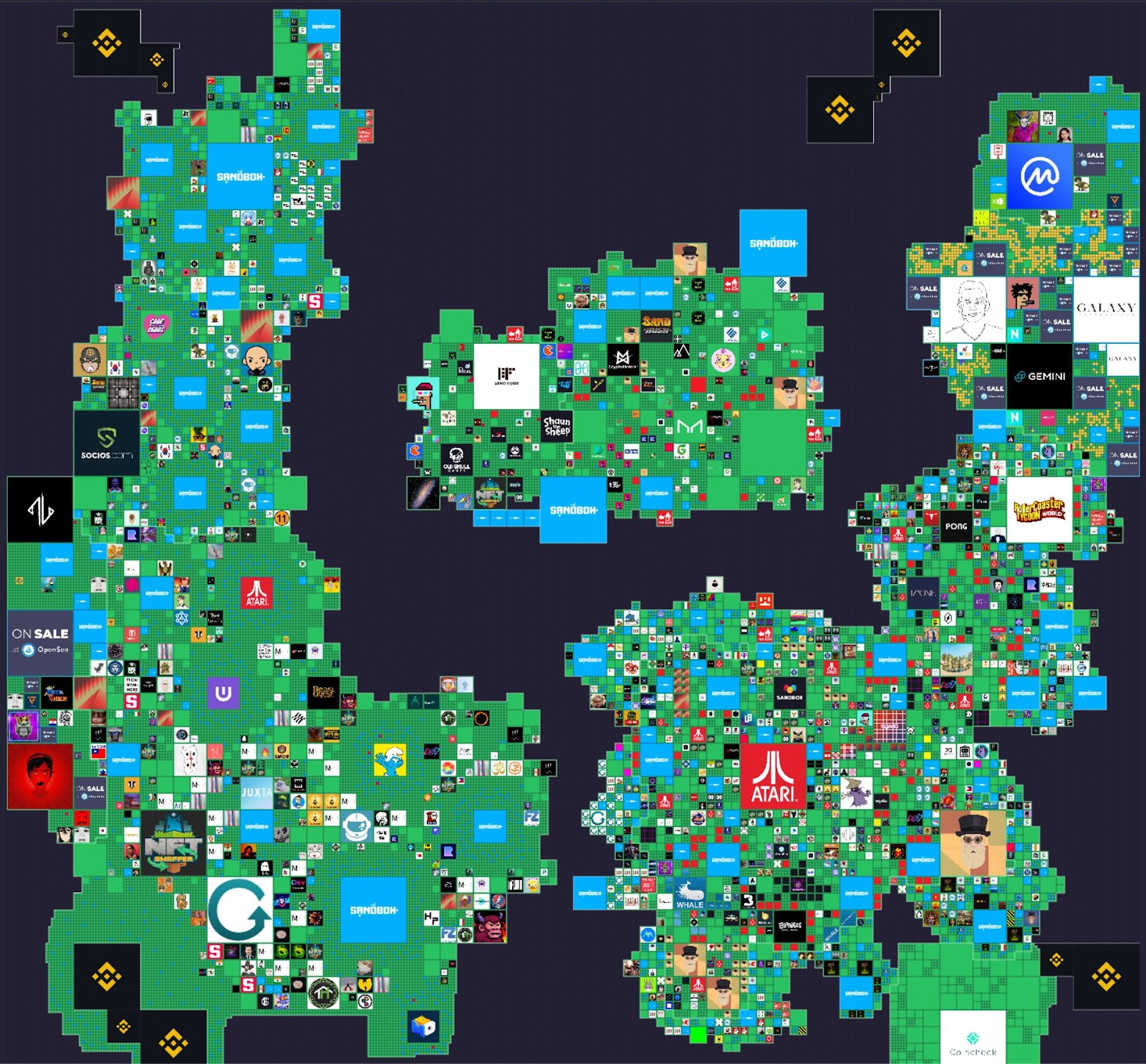Let's Discuss
Enquire NowA new trend has been boxing the world, will this trend be the coming big thing that will be answered in the future. Literally people are paying millions for plots of land which don’t physically exist on Earth. These lands are all located in a virtual world which experts have dubbed it has the metaverse. The word “ metaverse” describes a completely realized digital world that exists beyond the one in which we live.
 Figure 1: a Virtual land in Decentraland
Figure 1: a Virtual land in Decentraland
In substance, virtual land makes up a introductory structure block of “ The Metaverse”, a coming replication of the internet where physical and virtual worlds collide including hyperactive-realistic VR gests and its own husbandry. These surroundings have gained fashionability since the epidemic urged people to spend further time online. Exemplifications include Sandbox, Decentraland and Cryptovoxels, part virtual world and part game, which allow people to buy land in their own metaverses. Metaverse is estimated to be $1T value.
Just like physical land, it’s also vended in the form of plots and can be bought using the cryptocurrency of the land in question, for instance, MANA in Decentraland. Virtual lands are getting more precious and cryptocurrency suckers are paying real plutocrats to acquire them. NFT technology is also used to grease the power, buying, and selling of these land parcels. Decentraland is presently one of the most popular platforms, uses the Ethereum blockchain to record the power of all digital means and tradable particulars. MANA is Decentraland’s cryptocurrency tokens. Users will have to convert their deposit finances to MANA to buy any particulars in Decentralised business. The average price of land in Decentraland presently stands at around $195,779.94.
The Sandbox is a play-to- earn game that utilizes blockchain, DeFi and NFTs in a three-dimensional metaverse to allow players to produce and make their games and digital means, and also customize them using free design tools similar as VoxEdit and Game Maker. SAND is the utility token of The Sandbox that’s erected on the Ethereum blockchain and can be possessed by players for playing the game, buying virtual lands(LANDS in Sandbox) and means on the Sandbox Marketplace and customizing their incorporations.
 Figure 2: Virtual lands present in Sandbox platform
Figure 2: Virtual lands present in Sandbox platform
Investments in Virtual Lands
- It’s easier than buying real land, Virtual real estate does not have the major pain points associated with real-world deals, similar to the huge quantum of paperwork that needs to be done, land conservation, and levies that need to be paid. The perpetration of blockchain also makes land purchases more secure and traceable.
- Exponential returns Virtual land is suitable to offer exceptional returns due to its alignment with the fleetly expanding crypto-investment macrocosm. In other words, investors buy virtual land that’s still fairly low in price, and also take a delay-and- see approach until the price of that land rises to the point where they want to resell it.
- Everyone knows that land is an asset that in no way depreciates and is one of the most popular asset classes. Virtual real estate has become a licit asset class. Its value is adding exponentially, making it good of interest to investors. It also seems likely to come from a feasible store of wealth, nearly like real- world art and real estate.
- Regular income, like in the physical world Any proprietor of virtual land can earn a regular income from it, just as we do in the physical world. An investor can make a virtual shopping boardwalk using NFT on his land and rent it to any proprietor for a yearly income.
Pitfalls of Virtual Land
- Indeed if virtual land as a conception or asset class will go to the moon, it remains to be seen which inventors will turn out to be the winners. Maybe new games or events will come out that have further intriguing features which may lead people to abandon Sandbox or Decentraland before. Keep in mind that while Sandbox was firstly launched in 2012, the blockchain game is a pivot from their original game and it’s only officially launched in November 2021.
- Some disbelievers worry that virtual land is a hype amongst crypto- bookmakers but there won’t be enough real people interested in the end and not enough consumers who want to come and spend their money on the goods and gests being offered in the virtual world. The author of Second Life Philip Rosedale who is an early advocate of the metaverse and placarded in 2007 the 3D web will be dominant and we ’ll all have our avatars. Nearly 15 years later Rosedale is still enthusiastic about the virtual worlds-in specific use cases but also has several words of caution on the metaverse. He warns of how it’s stressful not to be suitable to use facial expressions, how not everyone will prefer living in the metaverse, and how there are still significant specialized walls to be overcome to give a flawless virtual reality experience.
Conclusion
The metaverse pledges to be an instigative new chapter of the internet, where our physical and virtual lives will combine further than ever ahead; virtual land will make up a crucial structure block in these new virtual worlds. Anyone buying a high piece of real estate in the right virtual world might be the new holy grail. Still, as an arising area there are significant pitfalls and we’re beforehand on in the relinquishment wind, meaning it’s still a bet which platforms will come out as the ultimate winners.
Have a business idea in virtual lands? Help yourself become an expert player in the Metaverse by working with Dexlock. Our specialisation in Web 3.0 cryptocurrencies, blockchain, virtual reality, and other related technologies can just be what you need! Contact us now.
Disclaimer: The opinions expressed in this article are those of the author(s) and do not necessarily reflect the positions of Dexlock.



